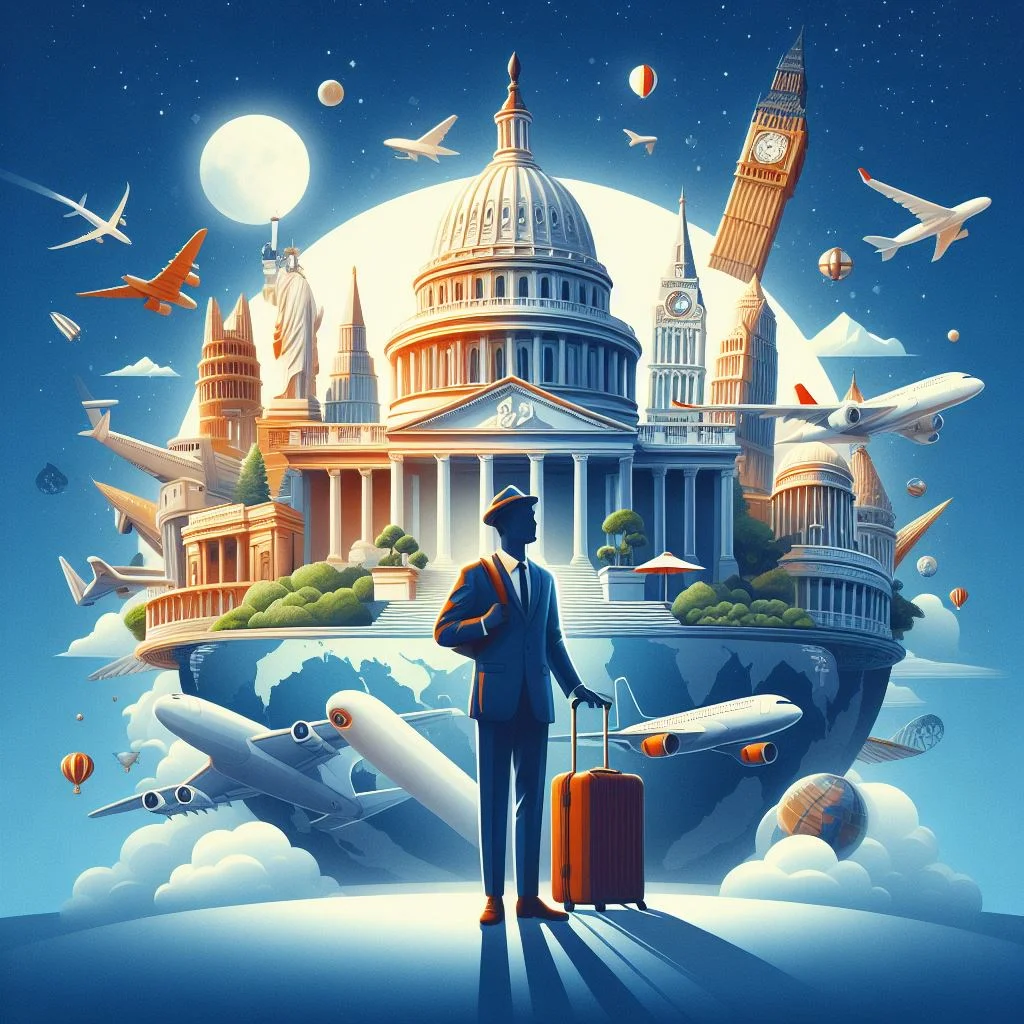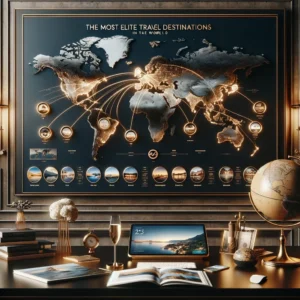Top Travel Agency in the World
#hotel, #tour, #travelguide, #destination, #booking
A travel agency is a business that helps people plan and book their trips. They can provide a variety of services, including:
- Booking flights
- Booking hotels
- Booking tours
- Renting cars
- Getting visas
Travel agencies can be a great resource for people who are planning a trip, as they can help them find the best deals and make sure that their trip goes smoothly. However, it is important to note that travel agencies can charge fees for their services, so it is important to compare prices before booking through a travel agency.
If you are considering using a travel agency, there are a few things you should keep in mind:
- Make sure that the travel agency is reputable and has a good track record.
- Get quotes from multiple travel agencies before making a decision.
- Read the fine print of any contracts carefully before signing them.
By following these tips, you can help ensure that you have a positive experience when using a travel agency.
Benefits of Using a Travel Agency
There are many benefits to using a travel agency, including:
- Expert advice and guidance
- Access to exclusive deals and discounts
- Peace of mind
- Convenience
- Personalized service
Let’s take a closer look at each of these benefits.
Expert advice and guidance
Travel agents are experts in the travel industry. They have a wealth of knowledge about destinations, airlines, hotels, and other travel-related topics. They can help you plan your trip, find the best deals, and avoid any potential problems.
Access to exclusive deals and discounts
Travel agents often have access to exclusive deals and discounts that are not available to the general public. This can save you a lot of money on your trip.
Peace of mind
Travel agents can take care of all the details of your trip, from booking your flights and hotels to arranging your transportation. This can give you peace of mind knowing that everything is taken care of.
Convenience
Travel agents can make the entire travel process more convenient. They can handle all the paperwork and communication, so you don’t have to. This can save you time and hassle.
Personalized service
Travel agents can provide you with personalized service. They will take the time to understand your needs and preferences and will work with you to create a trip that is perfect for you.
If you are considering taking a trip, I highly recommend using a travel agent. They can help you make the most of your trip and ensure that you have a memorable experience.
How to Choose a Travel Agency
Choosing a travel agency can be a daunting task, especially if you’re not sure what to look for. But by following a few simple steps, you can find a travel agency that meets your needs and helps you plan the perfect trip.
Here are a few things to consider when choosing a travel agency:
- Experience. How long has the agency been in business? Do they have a good reputation?
- Specialization. What types of trips does the agency specialize in? Do they have experience planning trips to your desired destination?
- Customer service. What kind of customer service does the agency offer? Are they available to answer your questions and help you plan your trip?
- Pricing. How does the agency’s pricing compare to other agencies? Are they transparent about their fees and costs?
Once you’ve considered these factors, you can start narrowing down your list of potential agencies. It’s a good idea to interview a few agencies before making a decision. This will give you a chance to ask questions and get a feel for their services.
When you’re interviewing an agency, be sure to ask about:
- Their experience planning trips to your desired destination.
- Their customer service policies.
- Their pricing structure.
- Their cancellation policies.
Once you’ve found an agency that you’re comfortable with, you can start working with them to plan your trip. Be sure to give them as much information as possible about your interests and budget, so they can create a personalized itinerary for you.
Working with a travel agency can be a great way to plan your next trip. By following these tips, you can find an agency that meets your needs and helps you create the perfect vacation experience.
FAQ
Q: What are the benefits of using a travel agency?
- Travel agents can help you save money on your trip. They have access to exclusive deals and discounts that you may not be able to find on your own.
- Travel agents can help you plan your trip in a way that fits your budget and interests. They can also help you find the best deals on flights, hotels, and other travel-related expenses.
- Travel agents can provide you with expert advice and guidance on everything from booking your flights to navigating a foreign country. They can also help you avoid common travel mistakes.
Q: What are the disadvantages of using a travel agency?
- Travel agents can be expensive, especially if you’re planning a complex trip.
- Travel agents may not be able to offer the same level of personalized service as a DIY trip.
- Travel agents may not be familiar with all of the latest travel trends and deals.
Q: How do I choose a travel agency?
- Consider the factors listed above, such as experience, specialization, customer service, and pricing.
- Interview a few agencies before making a decision. This will give you a chance to ask questions and get a feel for their services.
- Make sure you’re comfortable with the agency’s policies, such as their cancellation policies and fee structure.
Q: What should I look for in a travel agent?
- Experience: A travel agent should have experience planning trips to your desired destination.
- Customer service: A travel agent should be available to answer your questions and help you plan your trip.
- Pricing: A travel agent should be transparent about their fees and costs.
- Specialization: A travel agent should specialize in planning trips to your desired destination.
Finding the Best Deals on Travel
Finding the best deals on travel can be a challenge, but it is possible to save money if you know where to look. Here are a few tips for finding the best deals on travel:
- Use a travel agent. A travel agent can help you find the best deals on flights, hotels, and other travel expenses. They can also help you book your trip and make sure that everything goes smoothly.
- Book your trip in advance. The earlier you book your trip, the more likely you are to get a good deal.
- Be flexible with your travel dates. If you are flexible with your travel dates, you can often find cheaper flights and hotels.
- Consider traveling during the off-season. The off-season is typically the shoulder seasons, which are the months before and after peak season. During the off-season, you can often find cheaper flights and hotels.
- Consider traveling to less popular destinations. Less popular destinations are often cheaper than popular destinations.
- Use a price comparison website. A price comparison website can help you compare prices from different airlines and hotels. This can help you find the best deals on travel.
- Sign up for email alerts. Many airlines and hotels offer email alerts for special deals. By signing up for these alerts, you can be the first to know about upcoming deals.
- Use social media. Social media can be a great way to find travel deals. Many airlines and hotels post about upcoming deals on their social media pages.
By following these tips, you can find the best deals on travel and save money on your next trip.
Planning Your Trip
Once you have decided on your destination and budget, it’s time to start planning your trip. Here are a few things to keep in mind:
When to go. The best time to travel depends on your destination and interests. For example, if you’re planning a beach vacation, you’ll want to go during the summer months. If you’re interested in skiing, you’ll want to go during the winter months.
How to get there. There are many different ways to get to your destination. You can fly, drive, take a train, or take a bus. The best way to get there depends on your budget and time constraints.
Where to stay. There are many different types of accommodations available, from hotels to hostels to bed and breakfasts. The best place to stay depends on your budget and your travel style.
What to do. There are endless things to do in every destination. You can visit museums, go to concerts, see sporting events, or just relax on the beach. The best activities to do depends on your interests and budget.
Here are some tips for planning your trip:
Create a budget. This will help you stay on track and avoid overspending.
Do your research. Read travel guides, blogs, and articles about your destination to learn more about it.
Book your flights and accommodations in advance. This will help you get the best prices.
Pack light. You don’t want to be weighed down by your luggage.
Be flexible. Things don’t always go according to plan, so be prepared to adjust your plans if necessary.
Planning a trip can be a lot of fun, but it can also be a lot of work. By following these tips, you can make the process easier and more enjoyable.
FAQ
Q: When is the best time to travel?
A: The best time to travel depends on your destination and interests. For example, if you’re planning a beach vacation, you’ll want to go during the summer months. If you’re interested in skiing, you’ll want to go during the winter months.
Q: How do I get to my destination?
A: There are many different ways to get to your destination. You can fly, drive, take a train, or take a bus. The best way to get there depends on your budget and time constraints.
Q: Where should I stay?
A: There are many different types of accommodations available, from hotels to hostels to bed and breakfasts. The best place to stay depends on your budget and your travel style.
Q: What should I do?
A: There are endless things to do in every destination. You can visit museums, go to concerts, see sporting events, or just relax on the beach. The best activities to do depends on your interests and budget.
Q: How do I create a budget?
A: To create a budget, you need to first figure out how much money you have to spend. Once you know how much money you have, you can start to allocate it to different expenses, such as flights, accommodations, and activities.
Q: How do I do my research?
A: There are many different ways to do your research. You can read travel guides, blogs, and articles about your destination. You can also watch travel videos and talk to people who have been to your destination.
Q: How do I book my flights and accommodations?
A: The best way to book your flights and accommodations depends on your budget and time constraints. If you’re flexible with your travel dates, you can often find cheaper flights and accommodations. You can also book your flights and accommodations in advance to get the best prices.
Q: How do I pack light?
A: To pack light, you need to only pack the essentials. You don’t want to be weighed down by your luggage. When packing, try to roll your clothes instead of folding them. This will help you save space.
Q: What should I do if things don’t go according to plan?
A: Things don’t always go according to plan, so it’s important to be flexible. If your flight is delayed or canceled, you may need to change your plans. If your hotel is overbooked, you may need to find a new place to stay. By being flexible, you can handle unexpected changes in stride.
Booking Your Flights
Booking your flights is one of the most important parts of planning your trip. There are a few things you need to consider when booking your flights, including your budget, your travel dates, and your desired airline.
Budget
Your budget will be a major factor in determining which flights you can book. You should set a budget for your flights before you start looking, so you don’t get caught up in overspending.
Travel dates
The time of year you travel will also affect the cost of your flights. In general, flights are more expensive during peak travel times, such as summer and winter holidays. If you’re flexible with your travel dates, you can often find cheaper flights.
Desired airline
Some airlines are more expensive than others. If you have a particular airline in mind, you should check their website for the best deals. You can also use a flight search engine to compare prices from different airlines.
Booking your flights
Once you’ve considered your budget, travel dates, and desired airline, you can start booking your flights. You can book your flights online, through a travel agent, or by calling the airline directly.
Online booking
Booking your flights online is the most convenient option. You can compare prices from different airlines and book your flights in just a few minutes. Most airlines have online booking systems, and you can also use a flight search engine to compare prices.
Travel agent
If you’re not comfortable booking your flights online, you can use a travel agent. A travel agent can help you find the best deals on flights and book your flights for you. However, you should be aware that travel agents typically charge a fee for their services.
Airline booking
You can also book your flights directly with the airline. This is the most expensive option, but it may be the best option if you have a specific airline in mind.
Tips for booking your flights
Here are a few tips for booking your flights:
Set a budget before you start looking.
Be flexible with your travel dates.
Consider your desired airline.
Compare prices from different airlines.
Book your flights online or through a travel agent.
FAQ
Q: What is the best time to book flights?
A: There is no one-size-fits-all answer to this question. The best time to book flights depends on your budget, travel dates, and desired airline. In general, flights are more expensive during peak travel times, such as summer and winter holidays. If you’re flexible with your travel dates, you can often find cheaper flights.
Q: How can I find the best deals on flights?
A: There are a few ways to find the best deals on flights. You can compare prices from different airlines, use a flight search engine, or book your flights directly with the airline. You can also sign up for email alerts from airlines and travel websites.
Q: What is the difference between a direct flight and a connecting flight?
A: A direct flight is a flight that does not stop at any other airports. A connecting flight is a flight that stops at one or more other airports before reaching its final destination. Direct flights are usually faster than connecting flights, but they may be more expensive.
Q: What is the difference between a full-service airline and a low-cost airline?
A: Full-service airlines offer more amenities than low-cost airlines, such as free checked bags, meals, and entertainment. Low-cost airlines typically charge less for their flights, but they may have fewer amenities.
Q: What are some things to consider when booking flights for children?
Children under the age of two usually fly for free on the lap of an adult.
Children aged two to 11 typically pay a reduced fare.
Children over the age of 11 pay full fare.
You may need to purchase a separate seat for your child, even if they are under the age of two.
Check with the airline to see what age restrictions apply to children traveling alone.
Q: What are some things to consider when booking flights for pets?
Pets must be declared at check-in.
Pets must be in a carrier that fits under the seat in front of you.
Some airlines have weight restrictions for pets.
- Check with the airline to see what pet policies apply.
Choosing a Hotel
When choosing a hotel, there are a few factors to consider.
- The location of the hotel is important. Is it close to the attractions you want to visit? Is it in a safe area?
- The size of the hotel is also important. Do you need a large hotel with many amenities, or a smaller hotel with fewer amenities?
- The price of the hotel is another important factor. How much are you willing to spend on your hotel stay?
- The amenities offered by the hotel are also important. Do you need a hotel with a pool, a gym, or a business center?
- The reviews of the hotel are also important. What do other guests have to say about the hotel?
Once you have considered these factors, you can start narrowing down your choices. Here are a few tips for choosing a hotel:
- Read reviews of the hotel online. This will give you a good idea of what other guests have to say about the hotel.
- Compare prices of different hotels. Make sure you are getting the best possible deal.
- Book your hotel in advance. This will ensure that you get the best possible room.
- Ask the hotel about any special offers or discounts. You may be able to save money by booking a package deal or by staying during a slow season.
By following these tips, you can choose a hotel that meets your needs and budget.
FAQ
- What is the best way to choose a hotel?
- There are a few factors to consider when choosing a hotel, including the location, size, price, amenities, and reviews.
- What are some tips for choosing a hotel?
- You can read reviews of the hotel online, compare prices of different hotels, book your hotel in advance, and ask the hotel about any special offers or discounts.
- What is the best time to book a hotel?
- The best time to book a hotel depends on the destination and the time of year. In general, it is best to book your hotel at least 6 weeks in advance.
- What is the best way to get a good deal on a hotel?
- You can get a good deal on a hotel by booking in advance, comparing prices of different hotels, and looking for special offers or discounts.
Getting Around
Getting around in a new city can be daunting, but it doesn’t have to be. With a little planning, you can easily navigate your way around and explore all that the city has to offer. Here are a few tips for getting around:
- Research your options before you go. There are a variety of ways to get around a city, so it’s important to do your research and find out what’s available. Some cities have good public transportation systems, while others are more car-friendly. If you’re not sure what the best option is for you, ask a local or check out the city’s tourism website.
- Download a map or app. This can be a great way to get around a city, especially if you’re not familiar with it. There are a number of different maps and apps available, so you can find one that fits your needs.
- Ask for directions. If you’re lost, don’t be afraid to ask for directions. Most people are happy to help, and they may even be able to give you some tips on the best places to visit.
- Take your time. Getting around a new city can take some time, so don’t try to do too much in one day. Pace yourself and enjoy the experience.
Here are some specific tips for getting around by different modes of transportation:
- Public transportation: Public transportation is a great way to get around a city, especially if you’re on a budget. Most cities have buses, trains, and subways, and they can be a convenient and affordable way to get around.
- Taxis: Taxis are another option for getting around a city, but they can be more expensive than public transportation. However, they can be a good option if you’re in a hurry or if you need to get somewhere that’s not served by public transportation.
- Ride-sharing apps: Ride-sharing apps like Uber and Lyft are a great option for getting around a city. They’re usually more affordable than taxis, and they can be a good option if you’re traveling with a group of people.
- Car rental: If you’re planning on doing a lot of sightseeing or traveling outside of the city, you may want to consider renting a car. This can give you more freedom and flexibility, but it can also be more expensive than other options.
No matter how you choose to get around, getting around a new city can be a fun and exciting experience. Just remember to do your research and plan ahead, and you’ll be sure to have a great time.
Dealing with Jet Lag
Jet lag is a temporary condition that occurs when you travel across time zones and your body’s natural sleep-wake cycle is disrupted. Symptoms of jet lag can include fatigue, difficulty sleeping, irritability, and digestive problems.
There are a number of things you can do to help reduce the effects of jet lag, including:
- Adjusting your sleep schedule gradually before you travel
- Staying hydrated
- Eating light meals
- Avoiding alcohol and caffeine
- Getting some exercise
If you are experiencing severe jet lag, you may want to consider taking a melatonin supplement. Melatonin is a hormone that helps regulate sleep-wake cycles, and it can help to reduce the symptoms of jet lag.
It is important to note that jet lag is a temporary condition that will usually resolve within a few days. However, if you are experiencing severe jet lag, it is important to see your doctor to rule out any other medical conditions.
Enjoying Your Trip
Once you have arrived at your destination, it is important to relax and enjoy your trip. Here are a few tips for making the most of your vacation:
- Explore the local culture
- Meet new people
- Try new foods
- Take some time to relax
By following these tips, you can ensure that you have a memorable and enjoyable trip.




